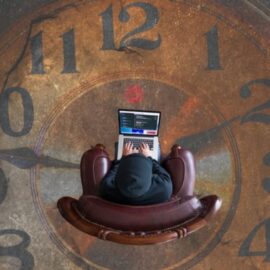

This article is an excerpt from the Shortform book guide to "Think and Grow Rich" by Napoleon Hill. Shortform has the world's best summaries and analyses of books you should be reading.
Like this article? Sign up for a free trial here .
What are the secrets to marketing yourself effectively? How will you recognize the new improvements in how you market yourself?
You can improve how you are marketing yourself by improving the quality and quantity of the services you offer. You must also boost the spirit of your business interactions by being pleasant with everyone you work with. Yearly self-analysis will help you track how well you are improving as a marketer.
Read on to learn more about the secrets of marketing yourself effectively.
The QQS Formula for Marketing Yourself Effectively
To market your services effectively you must follow the QQS formula:
- Quality: You must handle every detail as efficiently as possible, with the goal of improving your efficiency.
- Quantity: Provide as much service as you can, at all times. Continue to improve by increasing your skill and experience.
- Spirit: Be pleasant and you will get cooperation from others. The spirit with which you deliver your service determines the price you get and the duration of your financial relationship. Spirit can make up for deficiencies in quality and quality, but there’s no substitute for it.
You need all three of these elements if you want to have long-term contracts and relationships.
Self-Analysis
At the end of each year, you should conduct a self-analysis to reduce your flaws and increase your strengths. This will increase the value of what you can give (products or services) in return for riches. Annual self-analysis will show whether you’re marketing yourself effectively. Areas you should look at are your business interactions, and your personal goals and traits.
Personal
- Have I reached my yearly goal? You should have an annual goal that dovetails with your one major life goal or purpose.
- How can I better use my time and improve my habits to be more efficient?
- Have I improved my personality? How?
- Have I been disciplined or intemperate?
- Have I been open-minded and tolerant?
- How do I rank in mastering the principles of success? (Get a second, more objective opinion.)
Business Interactions:
- Have I delivered the best quality of service?
- Have I delivered the maximum quantity of service that I’m capable of?
- How have I improved my ability to deliver service?
- Have I worked cooperatively with others?
- Have I persisted in following through on plans, avoiding procrastination?
- Have I made decisions promptly and firmly?
- Have my interactions with colleagues been pleasant or unpleasant?
- Have I avoided egotism?
- Have my customers been satisfied? Would I be satisfied were I a customer?
- Have I inspired respect?
- Have I been too cautious or not cautious enough?
- Have I focused my energy on a single purpose rather than diluting it?
- Have I provided better service than I was paid for?
- Have I been unfair? How?
- Have I budgeted my time, expenses and income wisely? Have I wasted time?

———End of Preview———
Like what you just read? Read the rest of the world's best book summary and analysis of Napoleon Hill's "Think and Grow Rich" at Shortform .
Here's what you'll find in our full Think and Grow Rich summary :
- Napoleon Hill's 1937 guide to success
- How to use thoughts, visualization, and affirmation to achieve wealth
- The importance of a Master Mind group and how to start one






